In the fast-paced, ever-evolving world of business, the use of enterprise resource planning software (ERP) is no longer a luxury but a necessity.
ERP systems are crucial in modern organizations because they integrate various processes into a single, orderly operation. Those processes include project management, supply chain organization, and finances. But how do you select the right ERP system for your specific requirements? With so many options available, it can be a daunting task.
In this article, we’ll discuss the top 10 top ERP software systems and tools available today, highlighting their best features and potential limitations. After all, choosing an ERP data management tool is a choice that has a massive impact on your organization.
What is ERP Software?
Enterprise Planning (ERP) software is a type of software that organizations use to manage day-to-day business activities, such as accounting, procurement, project management, risk management, and compliance, among others.
Types of ERP Tools
There are many types of ERP software packages available that differ in the type of services they offer. Here are a few examples:
- On-premise ERP systems: these are hosted and managed on premises, giving organizations complete control over their data and processes.
- Cloud-based ERP systems: this type of system is hosted on the cloud,making it generally more cost-effective than on-premise systems.
- Mobile ERP systems: these are designed to be used on mobile devices, such as tablets and smartphones. This allows for greater accessibility of information and data from virtually any location.
- Customized ERP systems: this type of system is tailored specifically to the needs of a particular organization.
Essential ERP Software Features
When implemented correctly, an ERP system can streamline operations, improve efficiency, and give you a competitive edge. That’s why selecting the right ERP software is pivotal for your business’s operations and growth. Here are some vital aspects to consider that will aid your search for the ideal enterprise resource planning software implementation:
- Business needs: Identify your specific requirements. The ERP system must enhance your efficiency and cater to needs such as project management, financial management, supply chain management, or CRM (customer relationship management)
- Ease of use: Choose user-friendly ERP software. Overly complex ERP systems can negatively impact productivity and cause errors by adding more problems to your business processes
- Customization and scalability: As your business functions evolve, your ERP system should too. Opt for flexible ERP software you can tailor to your growing needs
- Integration capabilities: Prevent data silos and ensure seamless information flow with ERP software that integrates easily with your existing systems—whether it’s with your human resources, supply chain, inventory management, or financial management tools
- Customer support: Access to responsive and knowledgeable support can save valuable resources, particularly during the implementation phase or when issues arise
- Budget: consider all costs of the software system, implementation, and maintenance. Seek a solution that offers the best value within your budget to address core business processes
Align your growth plans with these factors to choose an existing ERP solution that supports your business in the long run.
The 10 Best ERP Tools & Software to Use
There are a lot of ERP solutions on the market—but it can get confusing as to which ERP systems work the best for your needs and know what features you should look for. Check out our top 10 best ERP software options to find something right for you.
1. ClickUp
ClickUp is an all-in-one project management and productivity tool that’s designed to serve organizations of all sizes. Its versatility allows teams to manage their resources, tasks, goals, and track time effectively.
Its extensive free plan offers various features that you can customize without the need for coding or add-ons, making it an excellent starting point for startups and smaller teams. With user-friendly interfaces and excellent customer service, ClickUp stands out among other ERP solutions because of its custom fields and tailored views.
ClickUp best features
- Extensive free plan with many features: It’s a robust tool that provides value even in its free offering, making it accessible to meet business processes of all sizes
- Import data from other tools: Migrate data from your existing tools and ERP solutions easily and without any data loss
- Excellent customer service: ClickUp stands out for its responsive and effective customer service, ensuring smooth implementation and troubleshooting
- Customizable CRM: ClickUp’s customer relationship management feature offers sales and success teams ERP systems to track budgets, contact information, and so much more.
ClickUp limitations
- The mobile app isn’t as fully-featured as the web application…yet
- There is no integration with Zoho Mail, which could be a downside for businesses that rely heavily on Zoho Mail for their operations
ClickUp pricing
If you need a full software suite to handle your Enterprise workloads and processes, we’d love to help set you up for success! Please contact Sales when you’re ready.
ClickUp customer ratings
- G2: 4.7/5 (6,000+ reviews)
- Capterra: 4.7/5 (3,000+ reviews)
📮 ClickUp Insight: 46% of knowledge workers rely on a mix of chat, notes, project management tools, and team documentation just to keep track of their work. For them, work is scattered across disconnected platforms, making it harder to stay organized. As the everything app for work, ClickUp unifies it all. With features like ClickUp Email Project Management, ClickUp Notes, ClickUp Chat, and ClickUp Brain, all your work is centralized in one place, searchable, and seamlessly connected. Say goodbye to tool overload—welcome effortless productivity.
2. Microsoft Dynamics 365
Microsoft Dynamics is a line of software systems that includes both enterprise resource planning software vendors and customer relationship management applications. These ERP systems are designed to help businesses of all sizes manage their entire operations, from sales and customer service to financial management and supply chain management.
With Microsoft Dynamics, you can map your processes and adapt the ERP software to your specific industry, enhancing your business performance and productivity.
Microsoft Dynamics 365 best features
- Tailor your business processes to meet your specific industry needs with customizable flows
- Microsoft Dynamics offers reliable security measures to protect your data
- Harness the power of AI to automate processes and gain insights for decision-making
Microsoft Dynamics 365 limitations
- The software is relatively expensive, making it a potential hurdle for small businesses
- There are restrictions on data storage that could be limiting compared to other ERP systems
- The software can be quite intricate to set up and may require technical expertise
Microsoft Dynamics 365 pricing
- Business Central Essentials from $70 per user/month
- Business Central Premium from $100 per user/month
Microsoft Dynamics 365 customer ratings
- G2: 4/5 (1,000+ reviews)
- Capterra: 4.3/5 (5,000+ reviews)
Check out these Microsoft Dynamics Alternatives!
3. Orion

Orion is a robust cloud and ERP software system that helps businesses streamline their operations and better allocate resources. It allows multiple teams to work simultaneously, enhancing collaboration and productivity.
It’s easy to use and compatible with most networks, so Orion makes it easy for businesses to monitor staff and keep track of their tasks and projects.
Orion best features
- Allows seamless collaboration and management across enterprise teams within your organization
- Ensures smooth operation across different network systems for core business processes
- ERP software system helps you track your team’s performance effectively
Orion limitations
- Sometimes notifications get lost, which can lead to missed updates or tasks
- Not the most affordable supply chain management and ERP system in this list
Orion pricing
Contact Orion for pricing
Orion customer ratings
- G2: 4.5/5 (14 reviews)
- Capterra: 4/5 (2 reviews)
4. NetSuite ERP
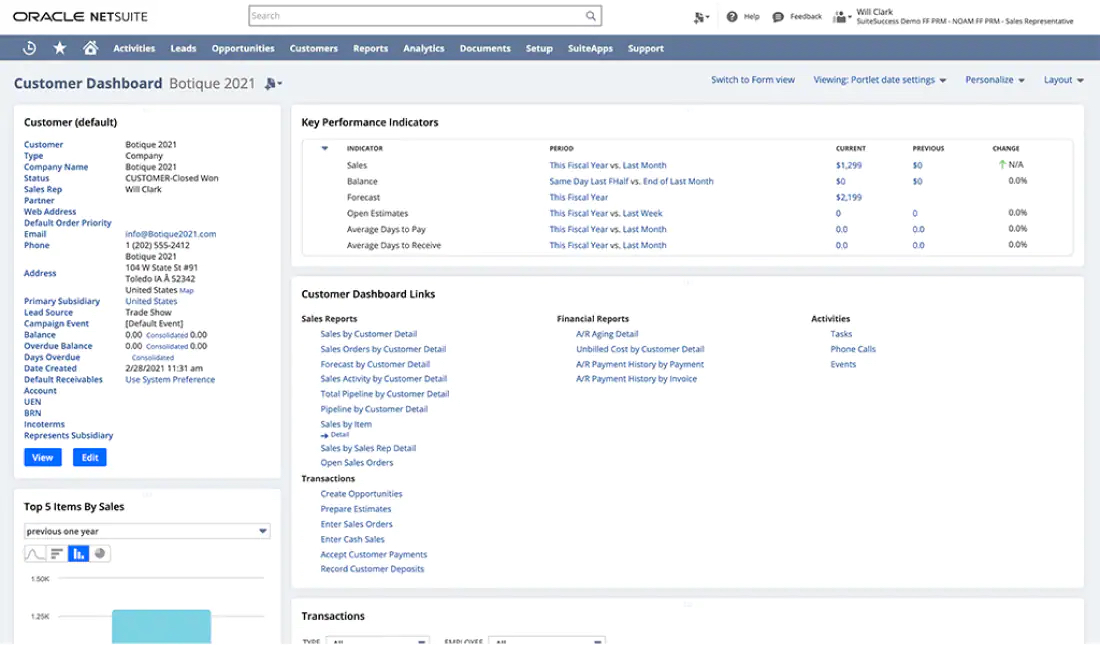
NetSuite ERP is a software-as-a-service comprehensive cloud-based ERP system designed for businesses of all sizes. It provides real-time visibility into the financial performance of your business. NetSuite is super customizable, which makes it easy to streamline your operations with a built-to-suit system.
NetSuite ERP best features
- Great financial reporting analytics let you keep a keen eye on your finances
- Seamlessly connect with other software like human resources tools for more efficient operations
- Cater the ERP system to your specific business needs and workflows
NetSuite ERP limitations
- It can take a long time to learn how to use NetSuite and product documentation is limited
NetSuite ERP pricing
Contact NetSuite for pricing.
NetSuite ERP customer ratings
- G2: 4/5 (2,000+ reviews)
- Capterra: 4.1/5 (1,000+ reviews)
5. ERPNext
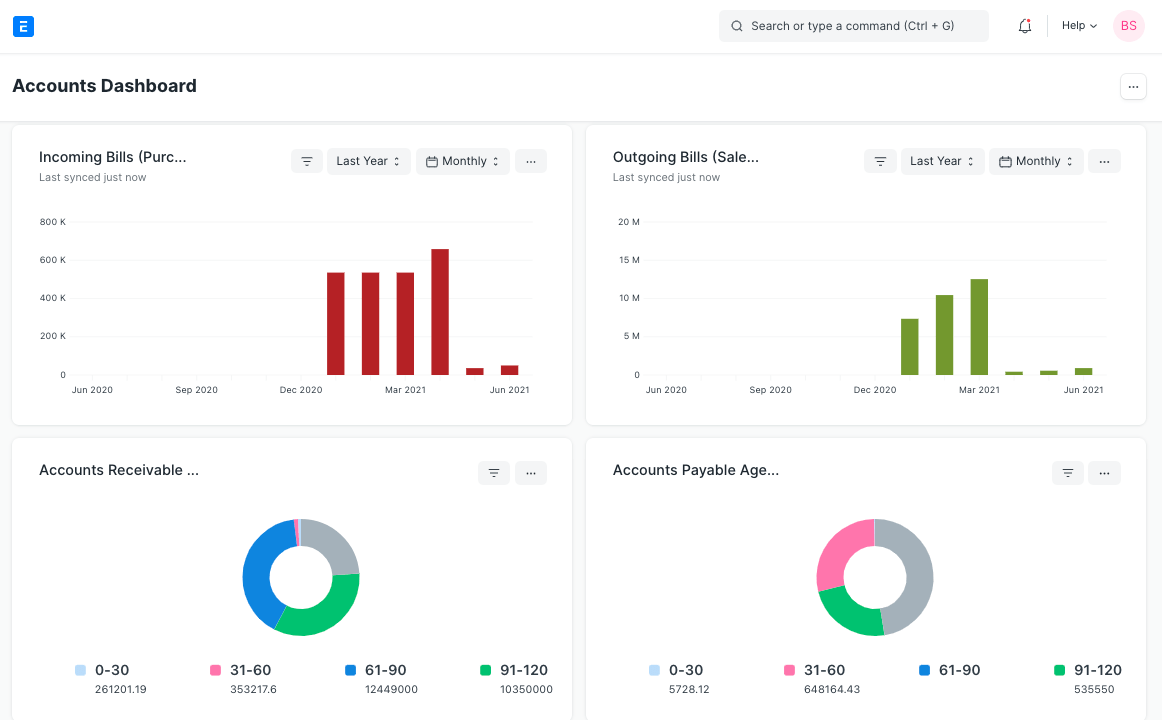
ERPNext is a free, open-source ERP system and accounting software. It is designed to be simple and user-friendly. Still, this ERP solution is powerful enough to manage all aspects of a business.
Low overhead costs make ERPNext especially effective for small and medium-sized businesses. Centralize your sales, purchasing, production, accounting, and human resources systems under one roof with ERPNext’s comprehensive set of features.
ERPNext best features
- Open-source approach keeps overhead costs low while providing robust features
- Streamlines human resources processes and reduces manual paperwork
- Offers an intuitive interface and easy-to-use functionalities
ERPNext limitations
- Setup and customization can be tricky compared to other ERP systems
- Documentation could be more extensive to help users understand and use the tool more effectively
ERPNext pricing
- Open source: free
- Cloud (managed hosting): $10/site per month
- Enterprise (up to 50 users): $1,250/site per month
ERPNext customer ratings
- G2: 4/5 (41 reviews)
- Capterra: 4.6/5 (134 reviews)
6. Oracle

Oracle’s enterprise resource planning system is a cloud-based software solution that’s designed to handle complex business operations. Users love its ability to handle large amounts of data, which makes this cloud ERP software suitable for large businesses with high data requirements.
Oracle’s toolkit includes solutions for financial management, project management, procurement, risk, enterprise asset management, and other core business intelligence functions. With third-party tool compatibility, Oracle extends its functionalities, delivering a holistic business management software solution.
Oracle best features
- Built to scale alongside your organization and overall business functions
- Manage multiple databases on a single server
- Lightning-fast performance means shorter query times
- Provides a wide array of general ledger and analytics—ideal for supply chain and inventory management
Oracle limitations
- Oracle’s licensing costs can be steep, especially for small and medium-sized businesses
Oracle pricing
Use the Oracle Cost Estimator
Oracle customer ratings
- G2: 4.5/5 (800+ reviews)
- Capterra: 4.6/5 (424 reviews)
7. Odoo
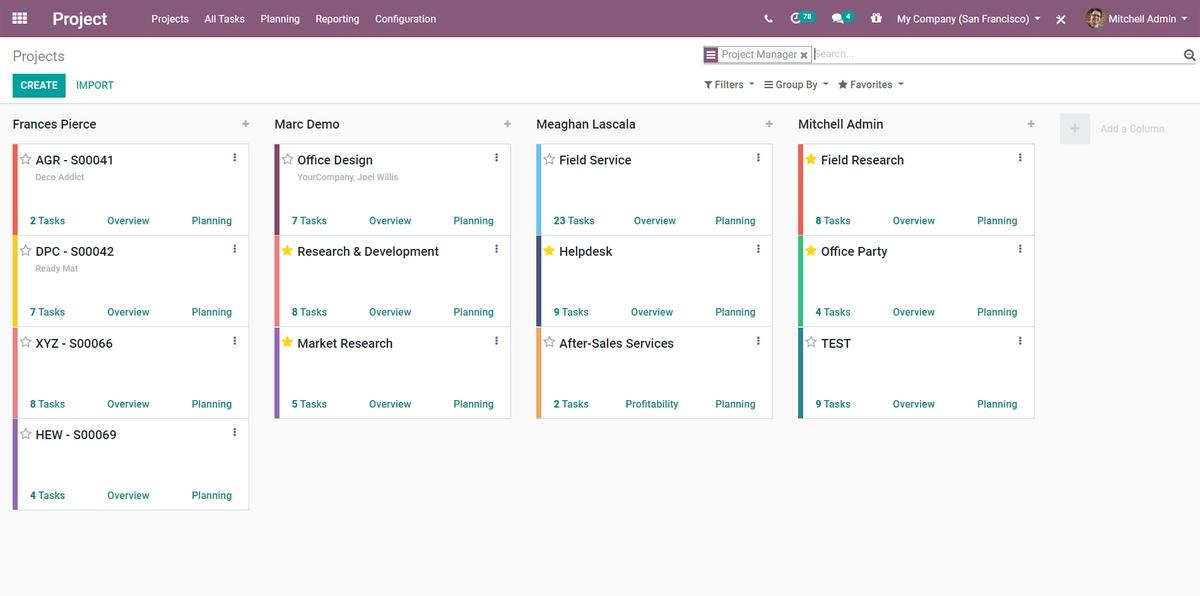
Odoo offers a range of business applications and enterprise resource planning systems to complete a suite of ERP software to power your business. With its free community version, Odoo makes the traditional ERP systems and software market accessible to startups and small businesses.
It offers various applications like billing, accounting, manufacturing, purchasing, warehouse order management, and project management. This ERP software has the ability to automate tasks and significantly enhances efficiency and productivity.
Odoo best features
- The community version is free; a major advantage for startups and small businesses
- Streamlines routine tasks to save time and increase efficiency
- Manages all aspects of your business, from sales and CRM, to supply chain and inventory management
Odoo limitations
- Configuration can be tricky
- Technical support is sometimes slow, according to some users
Odoo pricing
- One app: Free
- Standard: $24.90/user per month
- Custom: $37.40/user per month
Odoo customer ratings
- G2: 4/5 (200+ reviews)
- Capterra: 4.1/5 (600+ reviews)
Check out these Odoo alternatives!
8. Workday
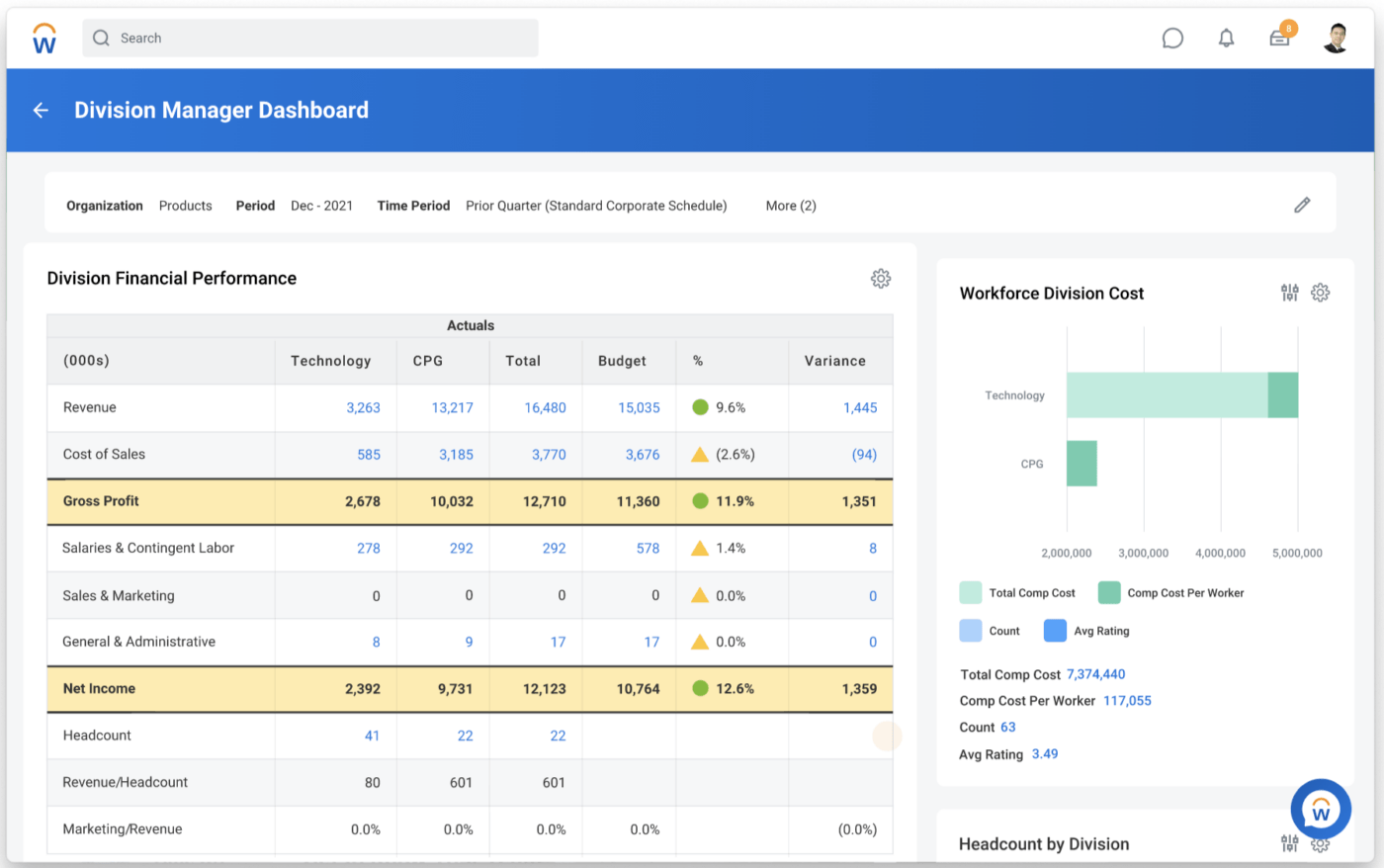
Workday is one of the leading enterprise resource planning systems for finance and human resources. It’s ERP systems offer a set of features designed to adapt to your organization’s needs.
In fact, Workday handles financial, human capital, and resource management with ease. You can monitor business performance with the platform’s deep analytics. Despite its complexity, the excellent reporting capabilities and high customization make it a desirable choice for businesses of all sizes.
Workday best features
- Manage employee vacation and sick time, and sync that information directly with the payroll tool
- Handle talent recruitment and new employee onboarding within the app
- Keep employees engaged with learning and development modules built right into the system
Workday limitations
- Learning to navigate the platform can be challenging
- Transitioning to Workday may require a significant amount of time and effort compared to other enterprise resource planning systems
Workday pricing
Contact Workday for pricing
Workday customer ratings
- G2: 4.1/5 (2000+ reviews)
- Capterra: 4.4/5 (1,000+ reviews)
9. Sage Intacct
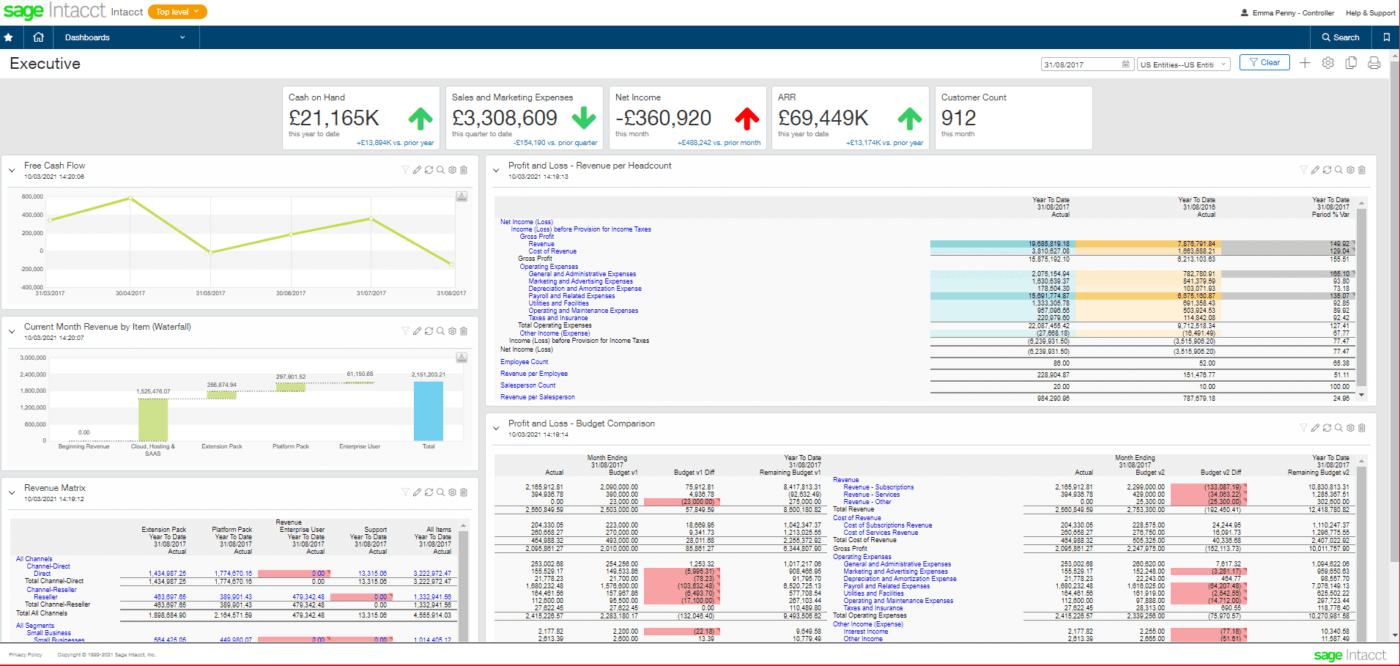
Sage Intacct is a cloud-based financial and asset management platform that provides deep accounting capabilities to streamline financial operations. It delivers a wide range of core accounting applications such as general ledger, inventory management accounts payable, accounts receivable, and cash management.
Its secure processes ensure that your financial data is well-protected, while the company data’s powerful reporting tools provide actionable business insights.
Sage Intacct best features
- Get paid fast with a straightforward, automated invoice system
- Allows you to access your business data from anywhere, anytime
- A vast library of financial reports means your company has no blind spots
- Track inventory from the manufacturing floor to the store shelf
Sage Intacct limitations
- Limited customization may not provide enough flexibility for some businesses
Sage Intacct pricing
Contact Sage Intacct for pricing
Sage Intacct Customer Ratings
- G2: 4.5/5 (2,000+ reviews)
- Capterra: 4.2/5 (300+ reviews)
10. Acumatica
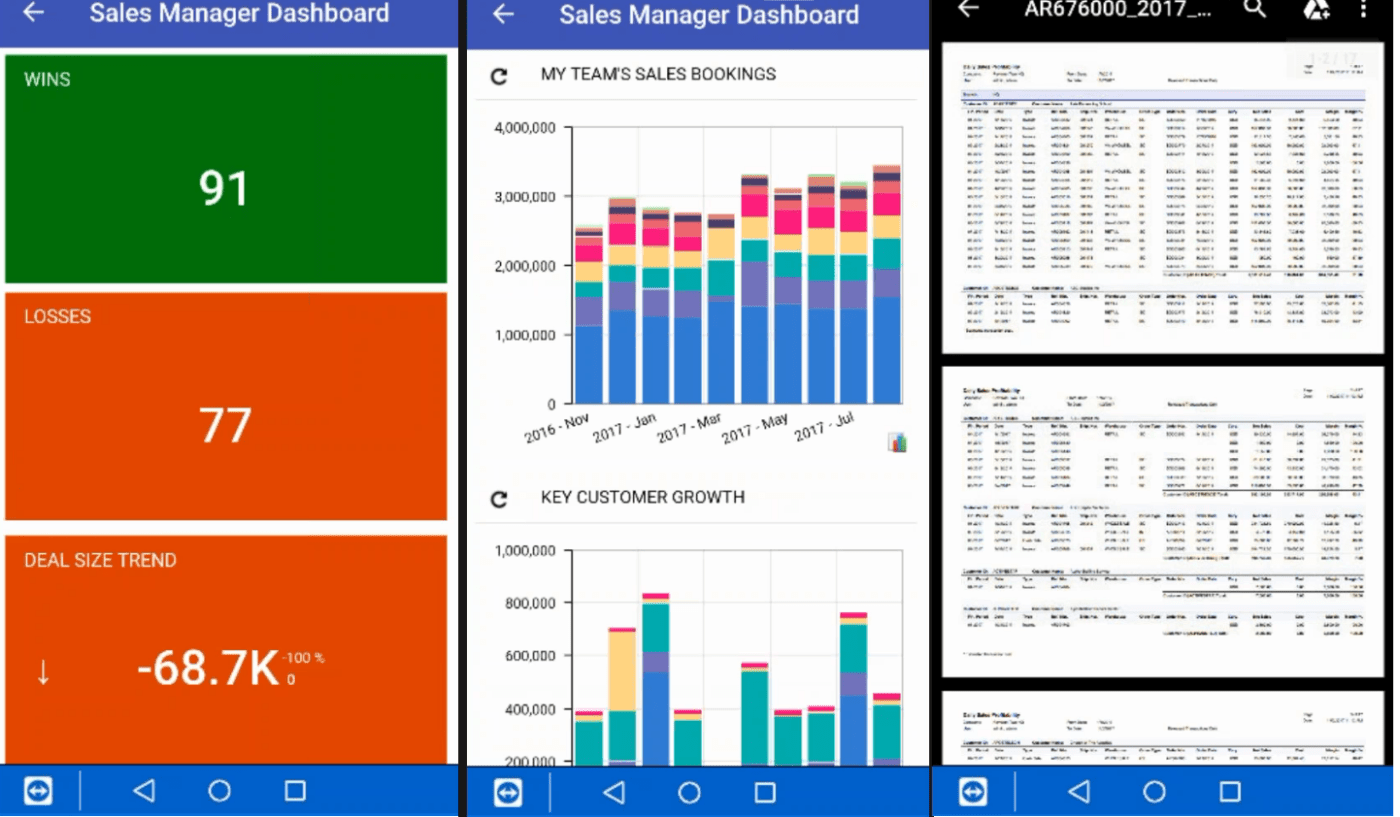
Acumatica is a cloud-based enterprise resource planning software (ERP) solution that provides a range of professional services automation tools for small to mid-sized businesses. Highly customizable and loaded with powerful features, Acumatica nonetheless maintains an easy-to-navigate interface, making it accessible for users of all levels of technical expertise.
Acumatica best features
- AI and machine learning capabilities help you automate business processes
- Top-of-class security protects your data, while role-based permissions make it easy to still collaborate with both internal and external colleagues
- Automatica’s cloud-based software gives you the flexibility to access and manage your business from anywhere
Acumatica limitations
- Understanding the total cost of ownership may require some time and effort
Acumatica pricing
Contact Acumatica for pricing
Acumatica customer ratings
- G2: 4.5/5 (700+ reviews)
- Capterra: 4.5/5 (70+ reviews)
Benefits of Using ERP Software
By streamlining processes, ERP software gives businesses the ability to stay productive and efficient. From reducing manual data entry errors to simplifying complex processes, here are some of the major benefits of using ERP software:
- Increased efficiency: Streamlined operations ensure that employees have access to accurate information without needing multiple applications or tools. This can help reduce time.
- Improved collaboration: With multiple teams working on the same system, all stakeholders can easily collaborate and stay in sync.
- Better reporting capabilities: ERP software allows businesses to access reports quickly and accurately. This will help you make better decisions about your business operations.
- Reduced costs: ERP systems reduce overhead costs by eliminating manual labor- Scalability: ERP systems are designed to grow with your business, so you don’t have to worry about outgrowing it.
- Flexibility: ERP systems are easily customizable and can be tailored to fit specific needs. This means that businesses can optimize the software for their own unique processes.
- Data accuracy:ERP software eliminates manual data entry errors, making it easier to access and manage accurate information. This can help businesses eliminate costly mistakes.
- Enhanced customer service: ERP systems provide businesses with better visibility into customer orders, meaning they can respond quickly and efficiently to customer inquiries.
- Better security: Most ERP systems come with built-in security features to protect sensitive data and ensure compliance with industry standards.
Discover the Perfect ERP Solution for Your Team
If your current ERP system isn’t bringing the efficiency and productivity you expected, perhaps it’s time for a change. ClickUp delivers an all-around business intelligence solution tailored to businesses of various sizes and industries.
Why not experience it firsthand? Reach out to our dedicated sales team, or sign up for FREE today. Yes, that’s right – it costs absolutely nothing to get started. Step into the driver’s seat and discover the unmatched benefits of managing your business operations with ClickUp.





